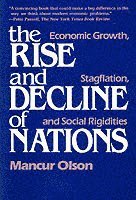
- Format
- Häftad (Paperback / softback)
- Språk
- Engelska
- Antal sidor
- 276
- Utgivningsdatum
- 1984-09-01
- Upplaga
- New ed
- Förlag
- Yale University Press
- Dimensioner
- 210 x 140 x 20 mm
- Vikt
- Antal komponenter
- 1
- ISBN
- 9780300030792
- 320 g
The Rise and Decline of Nations
Economic Growth, Stagflation, and Social Rigidities
Kundrecensioner
Fler böcker av Mancur Olson
-
A Not-so-dismal Science
Mancur Olson
-
Power And Prosperity
Mancur Olson
-
The Logic of Collective Action
Mancur Olson
-
The No-Growth Society
Mancur Olson, Hans Landsberg
Recensioner i media
"[Olson's] seminal work The Rise and Decline of Nations, published in 1982, helped explain how stable, affluent societies tend to get in trouble. The book turns out to be a surprisingly useful guide to the current crisis. . . . Olson's book was short but sprawling, touching on everything from the Great Depression to the caste system in India. His primary case study was Great Britain in the decades after World War II. . . . Olson's insight was that the defeated countries of World War II didn't rise in spite of crisis. They rose because of it."-David Leonhardt, New York Times "[T]his elegant, readable book . . . sets out to explain why economies succumb to the 'British disease,' the kind of stagnation and demoralization that is now sweeping Europe and North America. . . . A convincing book that could make a big difference in the way we think about modern economic problems."-Peter Passell, New York Times Book Review "Clearly, this is no ordinary theory. Equally clearly, it sprang from the mind of no ordinary economist."-James Lardner, Washington Post "Rises above the descriptive level of most books and directs our attention to the theoretical concerns in a way which gives the work a broader scope and the richness we have come to associate with the classic texts."-Kristen Monroe, Princeton University, New York University, from citation for Kammerer prize "A prize-winning performance: Olson's social theory of economic growth and decay is far superior to existing alternatives."-Aaron Wildavsky "Olson has taken the implications of his earlier work, The Logic of Collective Action, and used them in an extraordinarily innovative and impressive way. The result, quite apart from the specific predictions about when nations decline, is an important contribution to institutional economics-or equivalently, to the sociology of institutions. What makes the contribution especially important is its derivation from microeconomic foundations. The latter constitutes the most promising theoretical paradigm in the social sciences, yet little progress has been made in moving from micro to macro level. Olson's book constitutes a valuable step in that direction."-James S. Coleman
Du kanske gillar
-
Transformed
Marty Cagan
Inbunden
